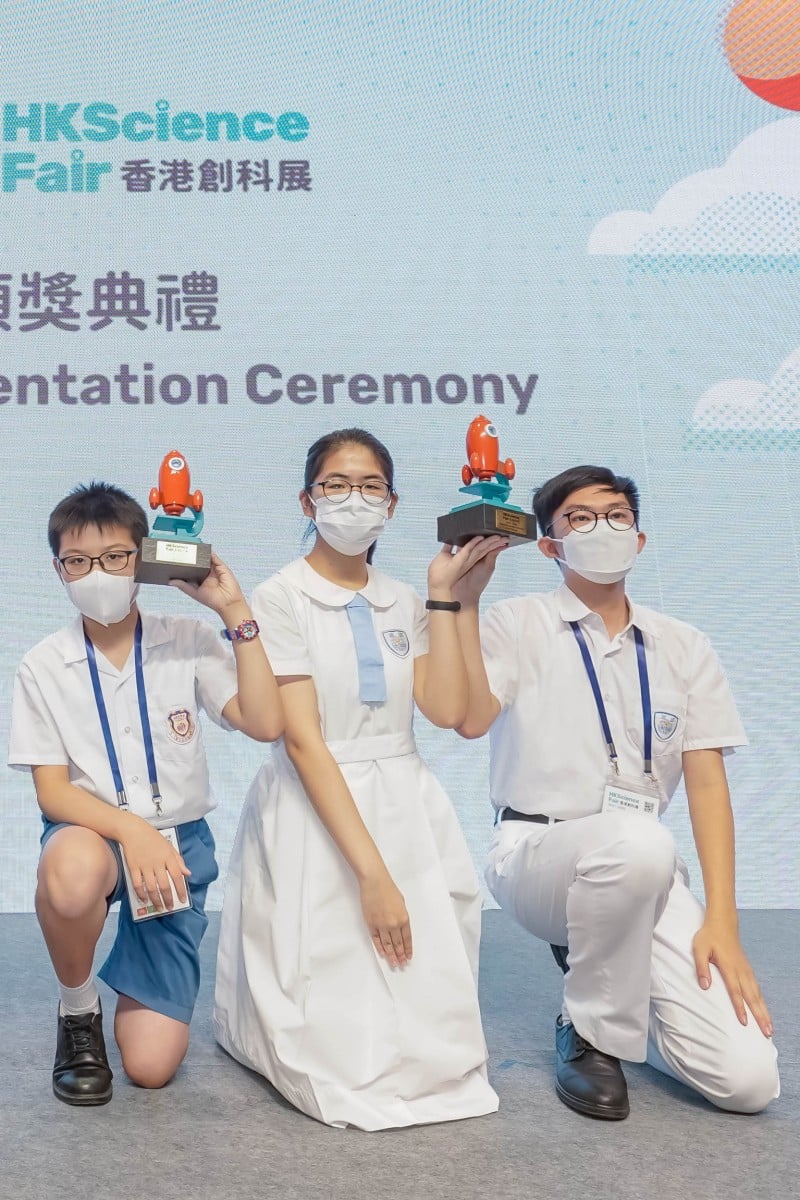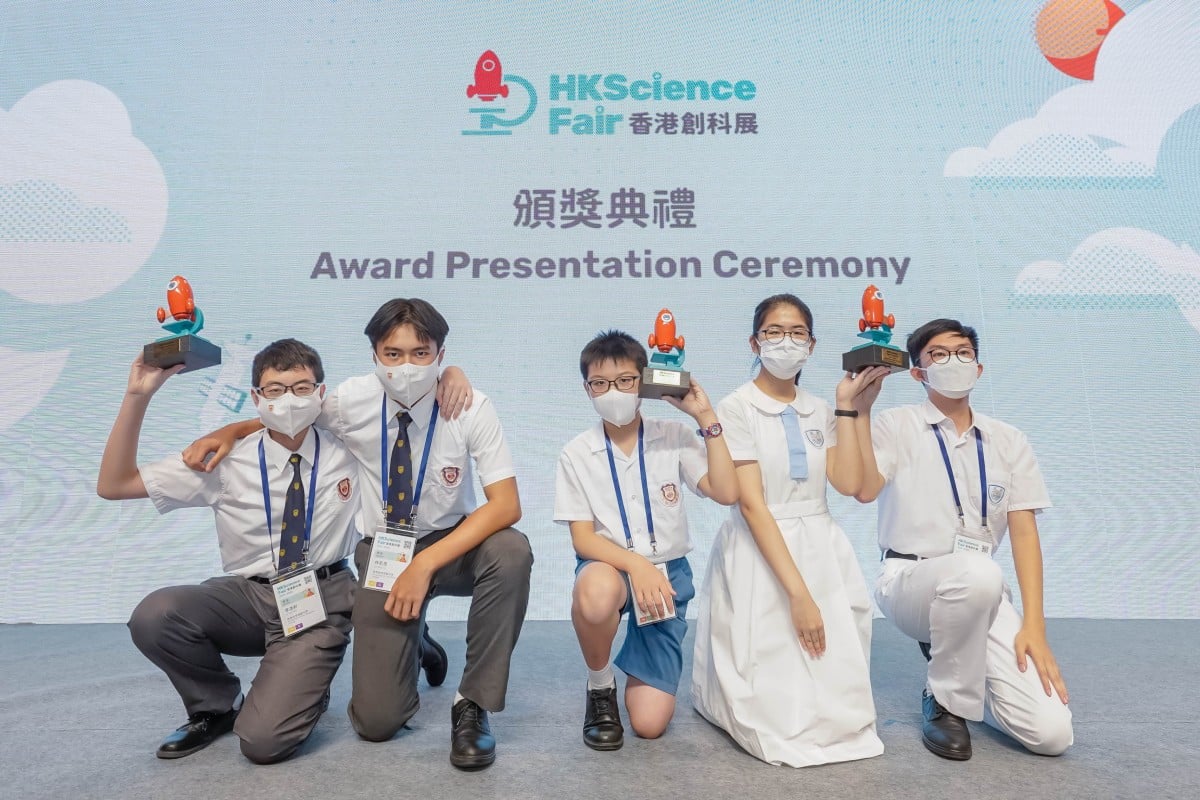
- Theme for this year’s event, held from June 25 to 26 at the Hong Kong Convention and Exhibition Centre, was ‘Think Big Be Innovative’
- Participants were encouraged to find human-centric solutions to real-life challenges
 From left to right: Po Leung Kuk Lee Shing Pik College (Inno-Beehive), PLK Fung Ching Memorial Primary School (Smart Water Tank+) and Heung To Middle School (Potassium Reduction Device) clinched the Gold Awards of the ‘Junior Secondary’, ‘Primary’ and ‘Senior Secondary’ divisions at the first-ever Hong Kong Science Fair.
From left to right: Po Leung Kuk Lee Shing Pik College (Inno-Beehive), PLK Fung Ching Memorial Primary School (Smart Water Tank+) and Heung To Middle School (Potassium Reduction Device) clinched the Gold Awards of the ‘Junior Secondary’, ‘Primary’ and ‘Senior Secondary’ divisions at the first-ever Hong Kong Science Fair. In a highly-charged atmosphere of excitement, the first-ever Hong Kong Science Fair was held from June 25 to 26 at the Hong Kong Convention and Exhibition Centre. Young innovators exhibited projects they had grown and cultivated from seedling ideas to working prototypes. Three tech-driven interactive zones also gave visitors a chance to experience different types of technology and their inventive applications.
Organised by the Hong Kong Innovation Foundation (HKIF), 120 primary and secondary student teams were shortlisted to showcase their creativity at the large-scale event themed ‘Think Big Be Innovative’.
Behind the scenes of how flavours in instant noodles and other foods are made
The breadth and depth of innovation and technology at the event very clearly presented the ways that work in these areas has helped humankind, and also how they evoke change and improve the world. Inspiration could be found everywhere from the science projects to the experiential activities offered, but especially from the highly-motivated students themselves.
Through participation in the Hong Kong Science Fair, students learned how to develop their ideas, improve them with additional research, testing and analysis, apply the knowledge gained from their studies across many disciplines including science, technology and design, and design and build working prototypes.
The platform created by the Hong Kong Science Fair offered the opportunity for students to apply learning by combining this knowledge with the limitless creativity young minds possess. A powerful combination of access to wealth of information, advanced technology, and the ability of young minds to truly think beyond traditional boundaries are drivers that will lead to positive change in the world.
On June 26, attendees of the award presentation ceremony were welcomed with speeches from Mrs Carrie Lam, Chief Executive of Hong Kong SAR, Mr Alfred Sit, Secretary for Innovation and Technology (I&T) of Hong Kong SAR and Dr Daryl Ng, Chairman of the Hong Kong Innovation Foundation.
Dr Daryl Ng commended the students for the zeal and dedication they showed to complete their creative projects while restrictions in the city were in place.
“We are honoured to have the opportunity to present the inaugural Hong Kong Science Fair,” Ng said. “This holds special meaning to us as we celebrate the 25th anniversary of the establishment of the Hong Kong Special Administrative Region this year. Nurturing innovation and technology talents from a young age is vital to the personal and professional growth of our young generations, to help them prepare for the future. This is crucial to Hong Kong’s growth as an international I&T hub. Students have come together thanks to their love of science and technology, and the passion and dedication they have demonstrated over the past few months, amid the pandemic, is truly inspiring.”
“I would like to sincerely thank the students for participating, as well as the parents, teachers, and headmasters for supporting our young innovators, and encouraging them to pursue their dreams, empowering them to present their creative ideas and inventions today,” he added.
From Marthe Gautier to Rosalind Franklin, the female scientists forgotten by history
While all the teams creatively applied and extended from the knowledge they had gained through their studies, the judging panel had the difficult task of choosing teams across the three divisions that received awards for designing and creating innovative and human-centric solutions to real-life challenges. The students all showed a willingness to think big, test limits in new ways, and to move out of their comfort zones in order to come up with solutions that they had not considered before.
The shortlisted projects were selected from more than 400 submissions received from over 1,200 Primary 4 to Secondary 6 students across 140 local schools. Teams presented projects covering thematic topics including ‘Smart City & Smart Home’, ‘Medical & Healthcare’, ‘Sustainability’ and ‘Life Full of Surprise’ based on where they perceived a need for innovative solutions.
Hong Kong student to pursue love of maths at Massachusetts Institute of Technology
The work of the 120 shortlisted teams took visitors to a world of inspired application of innovation and technology presented at Hong Kong’s premiere science fair. At the fair, the student teams actively engaged with visitors to garner their support for the ‘Most Popular Award’.
The judging panel awarded Gold to PLK Fung Ching Memorial Primary School (Smart Water Tank+) in the Primary division, Po Leung Kuk Lee Shing Pik College (Inno-Beehive) in the Junior Secondary division and Heung To Middle School (Potassium Reduction Device) in the Senior Secondary division. Ying Wa Primary School (Toilet Cleaning Assistant) was awarded the ‘Most Popular Award’ based on on-site voting.
Primary division Gold award winner, Ngai Cheuk San, designed a smart toilet water tank that has a disinfecting function as well as a filling system for the water tank.
He explained that an interest in conserving natural resources was built into the design as water collected from around the home, such as water used to wash vegetables or pets, could also be used to flush toilets. Thrilled with his win, he said, “I am honoured to have received the Gold award and am still a little shocked that I took the top award.”
In the Junior Secondary division, the Inno-Beehive team created a smart beehive offering bees a temperature- and humidity-controlled environment to thrive in.
“Bees are a keystone species in the ecosystem and many animals depend on bees for their survival because bees pollinate their food sources,” said team member Lin Ruo Yu.
“We are very happy as we had hoped to win and it came true!” added team member Li Yat Hin.
From Heung To Middle School, Raymond Lam Ka Ho said, “I wanted to use science to make life better for those afflicted with kidney issues and hopefully this can help many people.”
His Gold award project uses cellulose and other materials to reduce the amount of potassium in food. He added that the win has given him confidence to continue his studies and excel. He is currently working on a solution to reduce sodium content in food.
Experiential activities in the three fun-filled thematic interactive zones allowed visitors to experience innovation and technology firsthand. There was a Sticky Elf Workshop, a flight simulation experience by Aerosim and a ‘Space Odyssey’ AR Drawing installation for fans of AR and VR interactive games.
The student teams benefited from training workshops from experienced researchers and experts in their fields with the support of Hong Kong Cyberport, Hong Kong Science and Technology Parks, The Hong Kong University of Science and Technology, The University of Hong Kong, MIT Hong Kong Innovation Node and over 40 partners from various sectors.